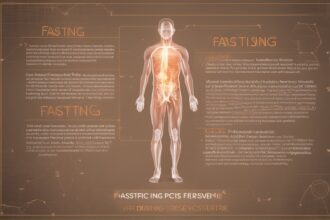Welcome to the fascinating world of fasting science! If you’ve ever wondered whether skipping a meal or two could actually boost your health, you’re in the right place. Over the past decade, research on fasting—particularly intermittent fasting—has exploded, revealing incredible benefits for metabolism, brain health, and even longevity. In this post, we’ll dive deep into the latest studies, break down complex concepts into bite-sized pieces, and offer practical advice to help you explore fasting safely. Whether you’re a newbie or a seasoned faster, let’s uncover how the science of fasting can transform your wellness journey.
What Is Fasting Science, and Why Does It Matter?
At its core, fasting science is the study of how abstaining from food for specific periods impacts the body and mind. Fasting isn’t just a trend; it’s a practice rooted in human history, often tied to cultural or religious traditions. Today, scientists are uncovering why fasting works on a cellular level. Research shows that fasting triggers processes like autophagy—where cells clean out damaged components—and ketosis, where the body burns fat for fuel. These mechanisms are linked to reduced inflammation, improved insulin sensitivity, and even protection against chronic diseases. Understanding fasting research helps us make informed choices about incorporating it into our lives for better health outcomes.
Key Findings from Recent Fasting Studies
The field of fasting research is buzzing with new discoveries. A 2021 study published in the journal Cell Metabolism found that intermittent fasting (alternating periods of eating and fasting) can improve metabolic health by enhancing the body’s ability to switch between energy sources. Another study from the New England Journal of Medicine in 2019 highlighted fasting’s role in reducing risk factors for heart disease and diabetes. Perhaps most exciting is the research on brain health—fasting may boost the production of brain-derived neurotrophic factor (BDNF), a protein linked to learning and memory. These findings underscore that fasting isn’t just about weight loss; it’s a powerful tool for overall well-being.
Health Benefits Backed by Fasting Science
Let’s break down some of the most compelling health benefits supported by fasting studies. First, there’s metabolic flexibility—fasting trains your body to efficiently use both glucose and fat for energy, which can stabilize blood sugar levels. Second, fasting supports weight management by reducing calorie intake and increasing fat-burning hormones like norepinephrine. Third, emerging evidence suggests fasting may slow aging by activating pathways like sirtuins, proteins tied to longevity. And let’s not forget the gut—fasting gives your digestive system a break, potentially improving microbiome diversity. These benefits, grounded in scientific fasting insights, make it clear why so many are turning to this practice.
- Improved Insulin Sensitivity: Fasting helps lower insulin levels, reducing the risk of type 2 diabetes.
- Enhanced Brain Function: Studies link fasting to better focus and memory through BDNF production.
- Reduced Inflammation: Fasting can lower markers of chronic inflammation, a root cause of many diseases.
- Cellular Repair: Autophagy during fasting removes damaged cells, promoting regeneration.
How to Start Fasting: Practical Tips from Science
Ready to dip your toes into fasting but not sure where to start? Don’t worry—fasting science offers plenty of guidance for beginners. Start with a simple approach like the 16:8 method, where you fast for 16 hours and eat during an 8-hour window. Studies suggest this is sustainable for most people and still delivers health benefits. Hydration is key—fasting doesn’t mean skipping water, so drink plenty to avoid dehydration. Also, listen to your body; if you feel dizzy or overly fatigued, ease into shorter fasting windows. Remember, the goal isn’t starvation but strategic timing to align with your body’s natural rhythms.
- Choose a Fasting Style: Experiment with 16:8, 5:2 (five normal eating days, two low-calorie days), or alternate-day fasting based on your lifestyle.
- Break Your Fast Gently: Start with light foods like broth or fruit to avoid digestive upset.
- Stay Active: Light exercise during fasting, like walking, can enhance fat-burning effects.
- Track Progress: Use a journal to note energy levels, hunger cues, and mood changes.
- Consult a Professional: If you have medical conditions, talk to a doctor before starting.
Potential Risks and What Science Says
While the benefits of fasting are impressive, it’s not a one-size-fits-all solution, and fasting research highlights some risks to consider. Prolonged fasting without proper preparation can lead to nutrient deficiencies, especially if your diet lacks variety when you do eat. Studies also warn that fasting may trigger overeating in some individuals, counteracting weight loss goals. For certain groups—pregnant women, those with eating disorders, or people with specific medical conditions—fasting can be harmful. A 2020 review in Nutrients emphasizes the importance of personalized approaches to fasting, reminding us to prioritize safety and balance over quick results.
The Future of Fasting Science: What’s Next?
The future of fasting science is incredibly promising. Researchers are now exploring how fasting impacts specific conditions like cancer, with early studies suggesting it may enhance the effectiveness of chemotherapy by stressing cancer cells. There’s also growing interest in fasting-mimicking diets, which replicate the benefits of fasting while allowing minimal calorie intake. As technology advances, wearable devices could help track fasting’s real-time effects on metabolism and stress levels. Staying updated on scientific fasting insights will be key as we learn more about optimizing this ancient practice for modern health challenges.
In conclusion, fasting science offers a compelling case for rethinking how we approach food and health. From boosting metabolism to protecting brain function, the evidence behind fasting is hard to ignore. But remember, it’s not about extremes—it’s about finding a rhythm that works for you, backed by insights from fasting studies. Start small, stay informed, and listen to your body as you explore this powerful tool. Have you tried fasting yet, or are you curious to learn more about fasting research? Drop your thoughts below, and let’s keep the conversation going on how science can guide us to better wellness!






